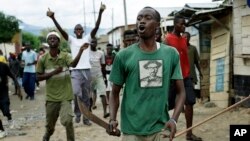Burundi's capital was rocked by demonstrations for a ninth day Wednesday as opposition supporters continued to protest a controversial decision by President Pierre Nkurunziza to run for a third term.
More than a dozen people were injured after protesters erected roadway barricades and set tires on fire in neighborhoods throughout Bujumbura, the Burundi Red Cross said Wednesday. In the Kinondo neighborhood of the capital, police fired shots into the air to disperse demonstrators who had been staging a sit-in.
The Red Cross said at least nine people have been killed in violent confrontations with the police since last week and scores have been wounded. Burundi police said the death toll is half that number.
Neighborhood protests
Musaga, about a 10-minute drive from central Bujumbura, is one of the poor suburbs hit by violent protests.
Here, youths armed with stones and sticks have lit bonfires on the road. Some of them surge when they see VOA reporters approach, demanding identities.
The protesters' leader is a suspicious man, especially as tensions are running high.
He says the protesters are blocking the road so police and the ruling party's youth wing, the Imbonerakure, cannot access their neighborhood.
"Imbonerakure, we have all chased them away from here; they are not here," he says. "These youths work with the government, and they are militias."
The situation is the same Wednesday morning. One of the protesters says, for safety, they are inspecting vehicles and visitors.
"Civilians are allowed to pass, but we check their cars if they are carrying criminals. We are doing so because they can bring in criminals, police and weapons. That's why we are checking all these vehicles," the protester from Musaga says.
On Wednesday in Kanyhosha, another neighborhood, protesters and youths supporting President Nkurunziza attacked each other. Nkurunziza supporters say the protesters attacked their party office and broke windows.
When a VOA reporter visited the area, there was a heavy presence of both police and the army in the streets.
Youth group accusations
The president's opponents have accused the youth group, Imbonerakure, which means "those that see far," of attacking protesters and working with the police to suppress the demonstrations against Nkurunziza.
Nikiziza David, a member of the youth group, says the Imbonerakure, like the protesters, have a stake in the country.
"We don't accept this; this will create a lot of troubles. We are also Burundians; we like and love our country. Why are they using other many efforts to disturb our calm? This is our office of governance," David says.
Imbonerakure leader Dennis Karera denied to VOA the allegations against the group but admits some members were involved in criminal activities.
"They can be wrong, and they can also be violent, but they are doing so as an individual, not as Imbonerakure," he says. "You are supposed to differentiate between these two. We have to punish him according to the law."
Demonstrations continued Wednesday in neighborhoods like Musaga, and many roads are still closed in Bujumbura.
Fleeing violence
Meanwhile, the U.N. refugee agency UNHCR said nearly 40,000 Burundians have fled to Rwanda, Tanzania and the Democratic Republic of the Congo in the past month, because of the political violence.
The demonstrations have plunged the African nation into its worst crisis since an ethnically charged civil war ended in 2005.
Jan Egeland, the head of the Norwegian Refugee Council and the former top humanitarian official for the U.N., called for international action to avoid a catastrophe in Burundi. "All lights are blinking in Burundi. All alarms are going. So where's the fire brigade?" he asked at a news conference in Geneva Wednesday.
With protesters refusing to back down, government ministers from East African Community nations, including Rwanda, Tanzania, Kenya and Uganda, traveled to Burundi Wednesday to help seek a solution to the unrest, said Edwin Limo, a spokesman of Kenya's foreign ministry.
On Tuesday, Burundi's constitutional court had validated Nkurunziza’s bid for a third term, but the deputy president of the court, who fled to Rwanda ahead of the ruling, called it unconstitutional.
Opposition leader Jean Minani said Wednesday that the ruling had not come as a surprise to him as it just showed that the constitutional court was under the control of the ruling party, CNDD-FDD.
Some material for this report came from Reuters and AP.




